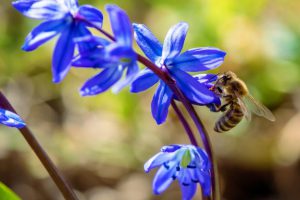 Study reveals how pollinators evade plant toxins
Study reveals how pollinators evade plant toxins
By Eric Ralls
Earth.com
New research is shedding light on the remarkable ability of pollinators such as honeybees to detoxify defense chemicals produced by plants.
Scientists from the University of Exeter and Bayer AG have discovered that these insects, which belong to the Hymenoptera order, have a unique set of enzymes allowing them to break down harmful alkaloid toxins found in plant nectar and pollen. This critical trait has been preserved across nearly 300 million years of evolution and is shared by various species within this order, including bees, wasps, ants, and sawflies.
Alkaloids are chemical compounds that many plants produce as a defense mechanism against herbivores. However, these toxins can also be found in the nectar and pollen that pollinators rely on for nourishment.
To better understand how these insects can tolerate such substances, the researchers examined the genes of several hymenopteran species. They found that all of the tested species produce the same group of enzymes, known as the CYP336 family of cytochrome P450 enzymes, which helps them tackle alkaloid toxins.
Dr. Angie Hayward, from Exeter’s Penryn Campus in Cornwall, explained the significance of this discovery: “These species differ greatly, but one thing they share is this ability to detoxify alkaloids. We were fascinated to discover this family of genes has been preserved across almost 300 million years of evolution by a whole order of insects with very diverse lifestyles.”
Interestingly, the research also revealed that even species with minimal contact with certain key alkaloids, such as nicotine, have retained the ability to metabolize them. Dr. Hayward compared this to the human tailbone or appendix, which are remnants of our evolutionary past.
To further investigate the enzyme’s capabilities, the researchers extracted the enzymes produced by the hymenopteran species and placed them in a cell-line to observe their reaction with alkaloids. The results confirmed that these enzymes do indeed detoxify the toxins.
Dr. Bartek Troczka, also from the University of Exeter, emphasized the importance of understanding how insects react to specific toxins: “Understanding how insects react to specific toxins is vital – it should inform how we produce any new chemicals such as pesticides and insecticides. To avoid environmental damage, we need very specific compounds that do very specific things.”
This study contributes to the broader attempt to understand how chemicals are broken down by insects and the extent to which the genes responsible for this process persist across insect groups.
Dr. Julian Haas, insect toxicologist at Bayer AG, praised the multidisciplinary nature of the research, stating that it “highlights the promise of multidisciplinary teamwork to better understand the molecular and evolutionary basis of detoxification mechanisms in insects, which will ultimately aid with the understanding of their interaction with other toxins, including insecticides.”
The study received funding from the Biotechnology and Biological Sciences Research Council (BBSRC) and Bayer AG.
To read about Plant Toxins go to;
Study reveals how pollinators evade plant toxins • Earth.com
We are here to share current happenings in the bee industry. Bee Culture gathers and shares articles published by outside sources. For more information about this specific article, please visit the original publish source: Study reveals how pollinators evade plant toxins • Earth.com






